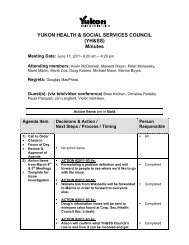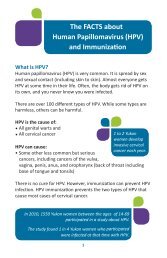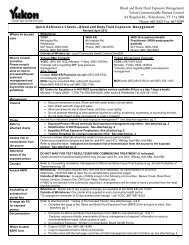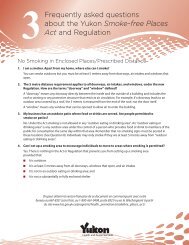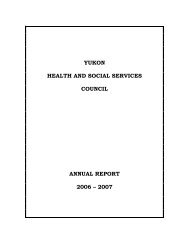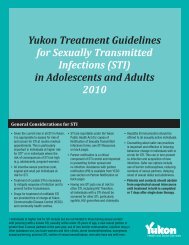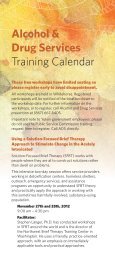Principles of Immunology - Health and Social Services
Principles of Immunology - Health and Social Services
Principles of Immunology - Health and Social Services
Create successful ePaper yourself
Turn your PDF publications into a flip-book with our unique Google optimized e-Paper software.
Community Nursing<br />
Yukon Immunization Program<br />
Section 14 - <strong>Principles</strong> <strong>of</strong> <strong>Immunology</strong><br />
2011 March<br />
Page 8<br />
Except for the phenomenon <strong>of</strong> cross-protective immunity, each antibody can recognize<br />
<strong>and</strong> bind to only one specific antigen <strong>and</strong> no other.<br />
Seroconversion is the phase <strong>of</strong> an infection when antibodies against an infecting agent<br />
are first detectable in the blood. To test for immunity against a particular disease an<br />
antibody titre may be ordered to assess the amount <strong>of</strong> circulating antibody specific to<br />
that pathogen.<br />
T cell-dependent antigens (Figure 4)<br />
<br />
<br />
Most antigens require the interaction <strong>of</strong> T cells <strong>and</strong> B cells to<br />
generate the production <strong>of</strong> antibodies. These antigens are<br />
referred to as T cell-dependent antigens.<br />
The antibodies produced in response to T cell-dependent<br />
antigens are primarily IgG <strong>and</strong> the response produces<br />
immunologic memory.<br />
T cell-independent antigens (Figure 5)<br />
<br />
<br />
<br />
In some situations, B cells can create antibodies without the<br />
help <strong>of</strong> T cells.<br />
Many common extracellular bacteria (e.g. Haemophilus<br />
influenzae type b) are surrounded by a polysaccharide<br />
capsule that enables them to resist ingestion by phagocytes<br />
<strong>and</strong> therefore avoid stimulating the T cell response<br />
Antibodies produced are <strong>of</strong> the IgM class <strong>and</strong> immunologic<br />
memory is not created.<br />
Figure 5<br />
T-cell Independent<br />
B<br />
Figure 4<br />
T- cell Dependent<br />
B<br />
APC<br />
T *<br />
B T * T-cell<br />
HELP<br />
B **<br />
B **<br />
B B**<br />
B *<br />
B *<br />
IgG<br />
IgM<br />
1.10 ANTIBODIES<br />
Classes <strong>of</strong> Antibodies<br />
There are five classes <strong>of</strong> antibodies: IgM, IgG, IgA, IgD <strong>and</strong> IgE. Each class performs<br />
particular functions. The immune response to injected vaccines involves IgG <strong>and</strong> IgM.<br />
Antibodies as a class are known as immunoglobulins:<br />
Immunoglobulin M (IgM):<br />
A valuable diagnostic marker for infectious disease because it is usually the<br />
first immunoglobulin made following Ag exposure <strong>and</strong> is relatively short-lived<br />
Effective in activating complement<br />
Participates in the lysis (bursting apart) <strong>of</strong> cells<br />
Generally remains in the blood; does not diffuse into the surrounding tissues<br />
due to its large size



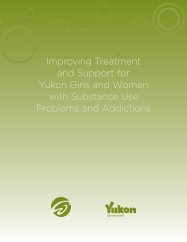
![Women and Alcohol: A women's health resource [2326.26 KB ]](https://img.yumpu.com/22340649/1/190x245/women-and-alcohol-a-womens-health-resource-232626-kb-.jpg?quality=85)


